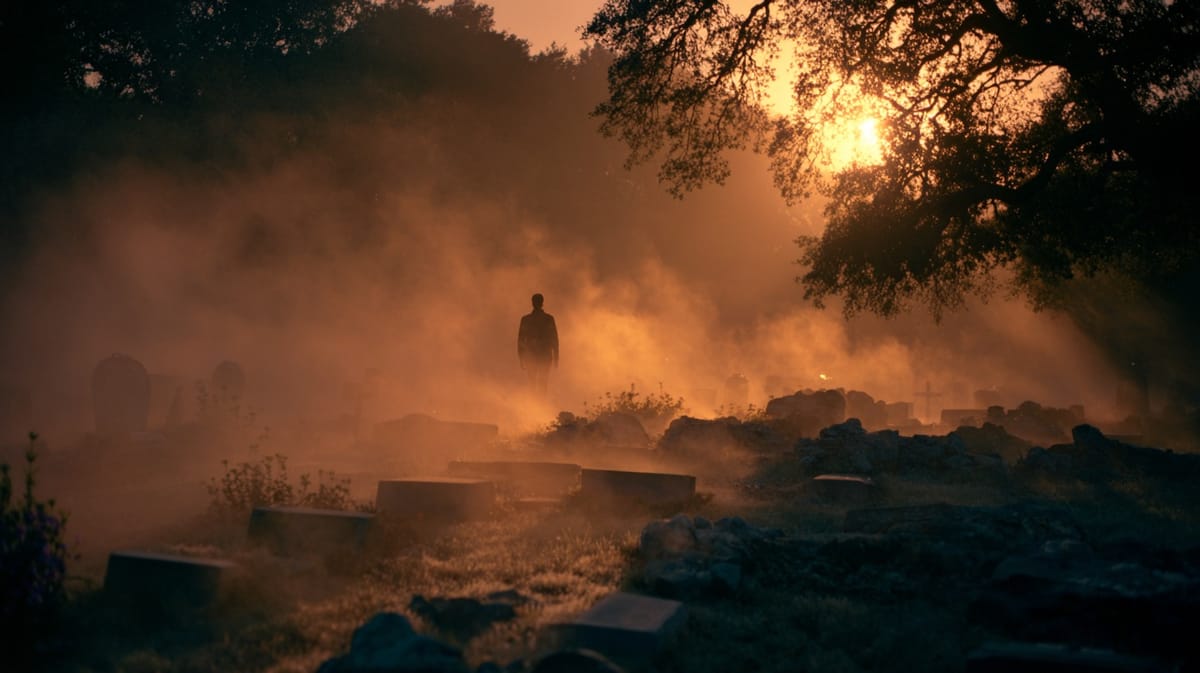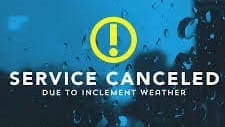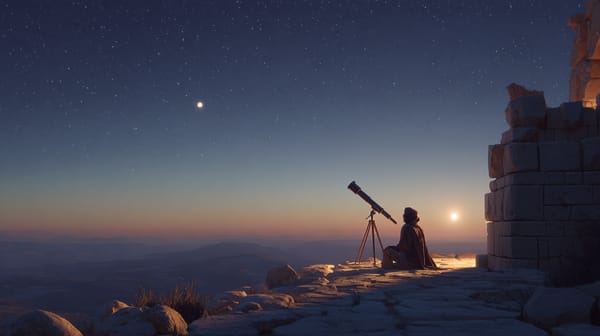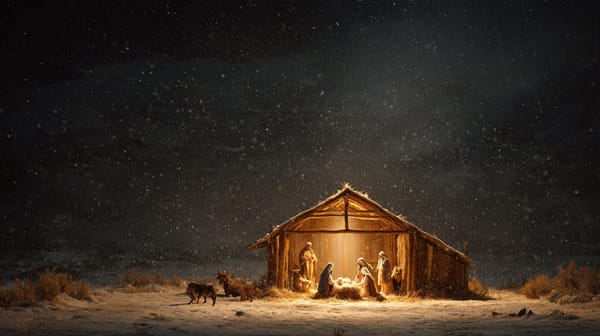Fairhaven Sermon 10-26-2025

Summary
In this week’s service, Rev Dylan Parson opened with a contemplative look at the quiet weight of cemeteries, noting how in Ohio towns the graves of early settlers stand as silent witnesses to a forgotten past. He drew a line from those long‑gone families to the present, reminding us that while their names may fade, God’s work does not. Parson anchored the sermon in Genesis 1 and Ezekiel 37, using the vision of dry bones to illustrate how God’s breath turns lifeless dust into living flesh—both literally for the dead and metaphorically for us as believers who are called to participate in this divine renewal.
Parson urged the congregation to see beyond the bleak image of stacked gravestones and recognize the promise that “the saints will not remain unnamed.” He spoke of God’s command to Ezekiel—“Prophesy over these bones”—and how that ancient proclamation echoes today, inviting each of us to claim the same breath of life offered through Christ’s resurrection. Concluding with a call to remember that we are not the forgotten bones of the past, but recipients of God’s living spirit, Rev Parson challenged the church to move forward with renewed hope, knowing that where there is God’s breath, there is also the power to rise again.
Transcript
And so the town in Ohio where I went to college was settled by people from colonial Massachusetts. But now they're forgotten. And most in that cemetery, because it was so old, belonged to people whose families and loved ones are long gone too. But that's not true of how God works.
And God reenacts this moment that we see in Genesis chapter 1, where breathing into lifeless dust, he creates Adam. As individuals with hearts and minds and souls and dreams. God enlists us to participate in it. was at work in Christ when God raised him from the dead and sat him at God's right hand in the heavens, And so I found in Europe last year, by first time there, it's really jarring to go into a cathedral or some great ancient church in Europe and find yourself surrounded in the ground, in the walls, by all these dead kings, these archbishops, these poets, these literal saints in some cases.
The God who puts skin on dry bones, who puts breath in dead lungs, promises that the saints will not remain unnamed. These stacked gravestones really bleakly represent the fear of death, what death looks like. So you have the winged skull that's very classic on stones from that era. to prophesy to a valley full of dry bones.
And this valley that was moments ago a lifeless desert, hopeless, depressing, overwhelming with just the sense of decay, is now an ocean of living, breathing human beings. And say to them, And the way that it's designed just makes you feel like you're somewhere on the edge of Salem in the 1700s. What is the richness of God's glorious inheritance among believers? Prophesy to the lifeless bones that litter our world, the dry bones of injustice, of despair, of sickness, of fear, of just not caring. Nameless, silent, numberless, jumbled chaos.
Ruach can also mean spirit. It can also mean wind. These bones will live because Christ lives and through him, so can we. which is inevitable over two centuries.
God's not going to teach Ezekiel anything. And then he answers God with a statement that's really a question. But awaiting this word from God to restore them to life, to put breath in their lungs, to put skin on their bones once more. whips through, rips among us even now.
And well before he even finishes the prophecy, this sound erupts. And so nestled in the back of this burying ground, in the back corners, in the shadows underneath the trees, there's a couple piles back there. Now that said, the prophet Ezekiel has a different outlook on this. But also through Ezekiel, God promises that God's going to bring them out of the graves.
Now, Ezekiel doesn't say yes. Now, if we're to prophesy, we need to know what to say. And so the correct answer to can these bones live again, human one, is see for yourself. But the promise from God remains here.
And it's like you're confronting a pile of bones on one hand, but also this hope that surrounds you. There are times in our lives when we feel like we're nothing more than a pile of dead bones. And sometimes I think we even feel worse than hopeless. And the word of life comes from God.
and standing among tombs, standing in a cemetery, Human one, God calls to Ezekiel once more, prophesy to the breath. Israel back in Ezekiel's time, these people possess no hope at all. But to return to the cemetery here for a minute. They can't be read.
I don't think they were mostly done on purpose, This promise comes from God to Ezekiel, but it's transmitted through the human ones. They're never going to stand next to the place where they originally marked. In the deepest darkness of this valley, when we're standing among bones, when we are bones, What does this look like? You all have heard this before, particularly around this time of year, but I love cemeteries. I think we feel apathetic.
Presumably, the prophet doesn't have much of an appetite for offering answers, for offering All of that that's mentioned in this story is all the same. God's not going to verbally impart some wisdom, some way of understanding the world. What is he doing? And so God responds back to Ezekiel, who's given a good answer here, not with wisdom, not with theology or some sort of explanation, but with a command. God tells Ezekiel what to say, what to believe, what to prophesy.
And what is the overwhelming greatness of God's power that is working through us believers? Sounds like an earthquake. In some ways, I think it's a shame that we no longer live among our dead in urban America and we keep our distance. but things freeze, things thaw and freeze again. God, in this story, could have spoken to the bones in this valley This powerful wind moves within you, You have the finger that's pointing towards heaven, reminding everybody that walks past that you're going to die.
And he says, Lord God, only you know. I envision Ezekiel wading through waist deep bones, our hope can be that the greatness of the past, As God walks him through this valley of bones, you imagine his sandals crunching on teeth It was on the western frontier at the time towards Columbus. The wind that carries Ezekiel, the breath that goes into the bodies, all of that's the same word. As far as they're concerned, they're completely finished.
far above every ruler and authority and power and angelic power, I think that's worse because that means we don't care. It's got this black wrought iron fence around it, and the markers are that old brown sandstone. They'll be raised up. And filled with divine breath, these people rise and they're a new creation.
And the bones all clatter together. Can these bones live again, God asks. And whatever person they told of, whatever lifespan, is just vanished. They'll be filled with spirit once more.
that same spirit that carried Ezekiel into the desert. All our hope, all that we've ever held onto is just lifeless, it's just cold, a heap of tombstones. And breath in the Hebrew here is the word ruach, which means all kinds of things in Hebrew. Of the great cloud of witnesses, of the saints that have come before, of all the hopes of the past, life, death, past, present, future, all in one place.
the legacy of love, the hopes that have come before, In the name of the Father and the Son and the Holy Spirit. Amen. Roots tear through the soil. certainty about matters of life and death and the power of God.
I always have. This back corner of the cemetery is just chaos. And that's a good answer. They're not going to remain these blank gravestones piled up in the corner.
That's the quote from Ezekiel. And so they have this beautiful old graveyard, like a burying ground, they call it in Puritan style. that God and Christ who rose is opening the way for us to do that too. They find the others that they belong to.
You know, hopelessness at least still recognizes that hope exists as a possibility. Instead, God gives him something to do. scrambling onto a big rock that's like an island in the middle. God's breath turns dust into life.
Never to be aware that their ancestor's gravestone is out of place or missing or damaged. And the Apostle Paul, who knew the resurrected Jesus, is telling the church this same kind This power is conferred by the energy of God's powerful strength. It's God's power, but it's Ezekiel who dares to live it out, who dares to speak it, that They'll be given a home on rich, fertile land and all things are going to be new again. all by himself, without Ezekiel even there, And they're held above the grass on these wood shims.
I was an unofficial tour guide for the cemetery in Slippery Rock when I was a teenager. any power that might be named now or in the future. none of that's actually passed. Many of these gravestones had been eroded by acid rain beyond readability.
Because the obvious answer, our answer, is flat out wrong. And God, to be clear, does not disagree that they're hopeless. And so Ezekiel prophesies to the bones exactly as God tells him to. And God tells Ezekiel, prophesy, tell this wind, this spirit to fill these bodies and make them live again.
These bones, the Lord explains to Ezekiel, they represent all the company of Israel, the children of God. and fingers, all this white dust kicked up behind him. The gravestones that are scattered above ground will never stand again, and the bones below them never. It's hidden away like junk in a closet, all these forgotten people and things.
God makes him a participant. This is our breath. They reassemble into human bodies with muscle and skin. He's just been carried by this wind of God, teleported into this apocalyptic location.
Amen. But one thing, even as I found a lot of peace there that always troubled me, is that over time, many of those stones had fallen. But I think here's the astounding thing that Ezekiel shows us about that. He climbs up and he yells, dry bones, hear the Lord's word.
We draw a little closer this year in spirit, if not in proximity, but in our cemeteries, for the most part, we put them out in the distance. and commanded them to live once more, to rise up, to march, to be revived. Not the granite we have now, but the old weathered sandstone. None of these promises that are in Ezekiel, They're stacked, like back and forth, like Lincoln logs.
One is like life breath that's in all living creatures, the breathing that marks us as alive, life breath. They're not going to remain dry bones. And more so, I think, than the stones that are still standing..
. And this is what happens. This is in our lungs. And Ezekiel prophesies.
I did a couple walkthroughs on the history days. This is the command that we're given. God's power is..
. of conversation, the church in Ephesus, here in Ephesians 1, as we heard: I pray that God says, prophesy over these bones. Like, theoretically, things could be better. And nameless, countless, identical bones are pulled together as people.
And we're certain that nothing is ever going to get better. Whenever Paul is speaking, God refers to these people as being in graves. Prophesy the Lord God proclaims, I am opening your graves. that are in the New Testament, that are in Revelation, He says all of that word for word.
actually makes it happen. And the people, this extraordinarily large company, Ezekiel says, the Hebrew word is the same as like a legion or an army. The answer a human one like you or I or Ezekiel would give, which is that the dead stay dead, And I love to walk there, particularly in the fall. And it's just dozens and dozens of sandstone slabs.
And God asks, Human one, can these bones live again? No. And they've got all these stark Puritan symbols on them. Human one. Because this is what God does.
I just like being there. All the saints of the past that we've loved and cherished, the hopes that we've held onto, The overwhelming greatness of God, the Ruach, the Ruach, This is the reality of death, of decay, of destruction. But they're still not alive, Ezekiel says. And I wonder, what does it look like? none of that is past.
You know, there's something about the environment that's very peaceful to me. And this is how I imagine the bones, the valley into which God drops Ezekiel. But apathy is worse because apathy is the darkest kind of depression. You, human ones, are sent to speak to the bones.
So Ezekiel doesn't know what he thinks. But that's not how God does it. It's present. We say like Israel did, our bones are dried up, our hope has perished, we're completely finished.
the eyes of your heart will have enough light to see what is the hope of God's call. It's now. They used to mark a grave somewhere in there. God's not finished yet.
It's still what God is doing. How can what is dead live again? So he hesitates a second, right? Instead, God turns to Ezekiel. You don't even have this desire for things to get better. To be in these resting places, like in Westminster Abbey, there were probably more dead people in there than living people.
They're together. It's an army of people that stands up. is true by the laws of nature, right? the joys, the dreams of the past, those things are never dead and gone. They're all there.
They come to life. But they're not living. You. You just kind of are.
You prophesy to the bones. They stand on their own two feet after being nothing more than a pile of bones. Right? Amen. You.
And they're like, oh, my God. But, You prophesy. And. God refers to these people as being in graves.
We're completely finished. Amen.



